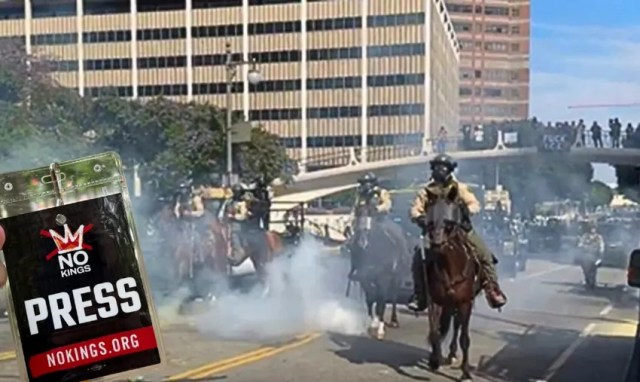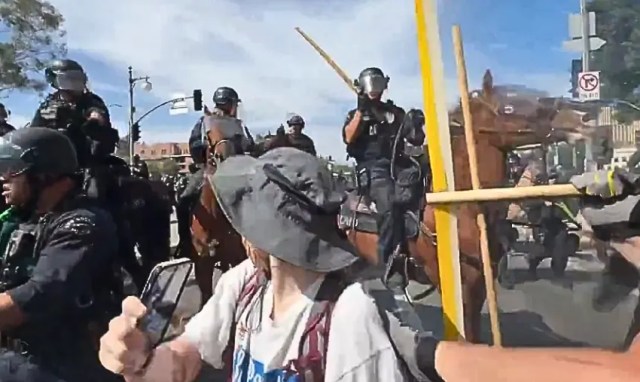It was a day that was supposed to go down in Los Angeles history - but not because of peaceful civic demonstrations or the strength of civil society. Instead, it was because of how the city responded to both. On June 14, 2025, the Los Angeles Police Department (LAPD) internally declared a state of emergency. The official reason, according to the operational order: an extraordinary incident. What followed was a display of force directed at the city's own population. As early as that morning, the LAPD ordered a full mobilization of all uniformed personnel. An internal memo titled “Full Mobilization” is in our possession. It is no rumor - it exists, documented in screenshots and excerpts, and confirms the complete restructuring of police operations to “maintain order.” The measure went into effect at 6:00 a.m. and remained active until the following morning. Days off were suspended, all units were switched to twelve-hour shifts, off-duty officers were recalled, and fixed posts were restructured.
The goal was clear: maximum presence, total control - and no gaps in the defense line against what authorities had labeled a threat: people with signs, voices, and demands. On that same day, the “No Kings” protests took place across the city - a peaceful movement opposing the growing concentration of power in the White House, surveillance, and authoritarian symbolism. On the streets: students, activists, families with children. On the other side: police, mounted units, National Guard - and a readiness to escalate that left many stunned.
We were on the ground ourselves - and what we witnessed was clear and documented. Tear gas was deployed even where people were already peacefully dispersing. Rubber bullets were fired without warning. Protesters were pushed to the ground, kettled in, prevented from leaving the area for hours - including children, elderly people, and individuals with disabilities. What we saw was not an isolated incident, but a deliberate and systematic operation. Our observations are consistent with those reported independently by colleagues at the LA Times, the Guardian, and other international media.
One of the most heavily criticized tactics was the use of mounted police, which in several cases served as a tool of targeted intimidation and violent disruption. Videos show horses being driven into tightly packed crowds, protesters being pulled down, trampled, or threatened with batons from the saddle. One elderly man was seriously injured when a horse reversed and knocked him to the ground. Journalists with visible credentials also reported being pushed aside by horses or nearly trampled. Lawyers and human rights organizations, including the ACLU, described the operation as a “coordinated campaign of intimidation” by state authorities. Entire blocks were sealed off without any prior warning or instruction to disperse. Even clearly identified members of the press were affected. Accreditations, press badges, and livestream tags provided only limited protection - some reporters said they were ignored, obstructed, or physically removed from scenes. Access to several areas was denied without explanation.
hat we experienced in Los Angeles can no longer be called policing. It crossed every line. It was the abuse of a uniformed power structure against a population exercising nothing more than its constitutional right to protest. Several civil lawsuits are now being prepared. They target not only the LAPD, but also federal entities that turned a political protest into a military-style operation by deploying the National Guard. The accusations include excessive use of force, violations of constitutional rights, and political intimidation. And while President Trump was holding his birthday military parade in Washington, Los Angeles revealed what happens when criticism is no longer tolerated: democracy is redefined as a threat - and protest becomes an extraordinary incident.
(Photos/Visual material: Publius, Elijah Schaffer, Kaizen Blog)






Die richtige Antwort wäre ein Generalstreik für wenigstens eine Woche, bei der alle einfach zu Hause bleiben und gerade nicht auf die Straße gehen.
Leider würden das viele ärmere Haushalte nicht überstehen, eine Woche nicht arbeiten zu gehen.
Ersatzweise eine Woche nichts einkaufen oder nur das Allernötigste. Auch das wäre ein Zeichen, gegen das die Staatsmacht machtlos wäre.
ja, das wäre in der tat die richtige antwort, leider fehlt den meisten das geld für so einen schritt
Und all die die willfähigen Helfer.
„Wir haben nur Befehle befolgt“ …….